Node-ified
Ethics: Contesting Codified Ethics as Unethical in ECEC in Ontario
Lisa
Johnston
York
University
Author’s
Note
Lisa
K. Johnston https://orcid.org/0000-0002-2209-2845
Correspondence
concerning this article should be addressed to Lisa K. Johnston, York
University, Winters College, 4700 Keele Street, Toronto, ON M3J 1P3.
Email: lkj@yorku.ca
____________________
Are
codes of ethics ethical? Some argue that the reduction of ethics into
universalized moral rules favours a scientific and technical
rationality for solving problems over an ethical and political
response to issues encountered in daily human and more-than human
relations (Dahlberg & Moss, 2005; Todd, 2003). I begin this
article by situating code of ethics in the broader
professionalization movement in early childhood education and care
(ECEC). Though codes of ethics are common in ECEC, emerging out of
the broader professionalization movement in Europe, Australia, New
Zealand, the United States, and Canada (Association of Early
Childhood Educators Ontario, 2008; Australian Early Childhood
Association, 1990; College of ECE, 2017; Early Education, 2011;
Feeney & Kipnis, 1989; The Office of Early Childhood Education,
2022), regulatory bodies, such as the College of ECE in Ontario, are
rare. The rarity of regulatory bodies in ECEC means that they have
not been explicitly included in critiques of the instruments of
professionalization, nor in advocacy regarding regulation of the
sector. In this article, I contest the ethical as described in codes
of ethics both generally and specifically as they have become legally
enforceable in the ECEC sector in Ontario through the establishment
of the College of ECE (2017). Thinking with Eve Tuck’s (2018)
question of “How shall we live?” (p. 157) and a critical
invitation from Sharon Todd (2003), I consider how ethics in
education might be “rethought together as a relation across
difference” (p. 2). Drawing upon Gunilla Dahlberg and Peter
Moss (2005), I discuss the dematerialization of early childhood
educators (ECEs) and the instrumentalization of ECEC in Ontario
through the implementation of the Code of Ethics by the College of
Early Childhood Education. I engage in a speculative critique of
codified ethics located within a regulatory body by invoking the
imagery of nodes in Alex Rivera’s (2008) film Sleep
Dealer.[1]
The film depicts a violent techno-rational step into a dystopian
future where workers are connected to a network through cables and
wires inserted into their bodies via nodes. I work conceptually with
the idea of nodes, depicted in the film as points of connection in a
network, to present a haunting metaphor for the dematerializing and
instrumentalizing effects of codified ethics on ECEs, and in
conversation with Joanna Zylinska (2014) and Tim Ingold (2011), I
reframe instrumentalized nodes/codes of ethics within the complexity
of knots and meshworks to recover the ethical in early childhood
education. I offer this speculative piece as both a warning against
the instrumentalization of ECEs and a call to activism to reposition
ethics as a relational practice in ECEC and to reclaim the imagery of
nodes/knots as points of ethical relations (Ingold, 2011; Zylinska,
2014).
Codes
of Ethics and the ECE Professionalization Movement
During
the late 1980s and early 1990s movements to professionalize ECEC were
gaining momentum across Europe, the United States, Australia, New
Zealand, and Canada (Cannella, 1997; Langford et al., 2013; Osgoode,
2006; Popkewitz, 1994; Saracho & Spodek, 1993; Urban et al.,
2012). Professionalization in ECEC was driven by a number of factors
including, but not limited to, an increasing demand for the
accountability of ECEs by the public and the struggle by ECEs
themselves for better wages and working conditions as well as the
recognition of ECEC as professional work (Cannella, 1997; Langford et
al., 2013; Osgoode, 2006; Popkewitz, 1994; Saracho & Spodek,
1993; Urban et al., 2012). In the mid-20th century, in Canada and the
U.S. specifically, the proliferation of child study and child
development theories began to form the foundations of preservice
training programs for ECEs (Cannella, 1997), which further
contributed other strategies of professionalization such as
certification, credentialing and licensing of ECEs and ECEC programs
(AECEO, 2010; Saracho & Spodek, 1993). The creation of codes of
ethics also emerged out of this movement toward professionalization
and were intended to provide guidance and consistency for ECEs in
navigating the moral and ethical dilemmas they grappled with in their
everyday work with young children and families (AECA, 1990; Early
Education, 2011; NAEYC, 1998; see also Feeney & Kipnis 1989;
Katz, 1984; The Office of Early Childhood Education, 2022).
ECEs
in Ontario, like their counterparts internationally, have
historically suffered from low wages and poor working conditions
including a lack of respect, job security, and benefits (Child Care
Sector Human Resources Council, 2013; Doherty et al., 2000).
Achieving professional status, it was hoped, would address these
issues and bring about better wages and working conditions for ECEs
(Langford et al., 2013; Urban et al., 2012). As the professional
association for ECEs since 1950, the Association of Early Childhood
Educators Ontario (AECEO) has been actively working toward the
professionalization of ECEs through certification, credentialing, and
professional development as well as actively advocating for the
recognition ECEs in the form of professional pay and decent work
conditions (AECEO, 2016; Langford et al., 2013). The AECEO developed
its own code of ethics in 1982, which was revised in 1994 and
distributed to all licensed childcare programs in Ontario (AECEO,
2010). Two years later, the AECEO campaigned and proposed legislation
for the establishment of a regulatory body. Claims put forward by the
AECEO suggested that a regulatory body would realize the goal of
“legislative recognition” of ECEC as a profession and,
therefore, was expected to naturally translate into professional pay
and better working conditions (AECEO, 2010, p. 21). Though the
AECEO’s attempt to pass their bill for a regulatory body was
unsuccessful in the Ontario Legislature, they continued to lobby for
a College of ECE and in the meantime voluntarily assumed the role of
a regulatory body for ECEs predominantly though their certification
process (AECEO, 2010).
In
2007, the College of ECE was finally established in Ontario. The
first of its kind, this regulatory body ushered in a new era of
professionalization signaling progress and promise for ECEs in
Ontario. With the creation of the College of ECE a new code of ethics
was introduced. Like its predecessor, the College of ECE’s code
of ethics outlined ECEs’ moral and ethical responsibilities to
children, families, colleagues, the profession, the community, and
the public (College of ECE, 2017, p. 7). Alongside the code of
ethics, the College of ECE also introduced six standards of practice:
Standard I: Caring and Responsive Relationships, Standard II
Curriculum and Pedagogy, Standard III: Safety Health and Well-being,
Standard IV: Professionalism and Leadership, Standard V: Professional
Boundaries, Dual Relationships, and Conflicts of Interest, and
Standard VI: Confidentiality, Release of Information and Duty to
Report. Each standard has three sections that outline the principles,
knowledge, and practices required of ECEs in their practice as
professionals (College of ECE, 2017, pp. 8-20).
The
role of the College of ECE in establishing professional status for
ECEs, however, is often misunderstood. It does not provide any direct
benefits to ECEs themselves but rather indirectly raises the
professional status of ECEs through its mandate to protect the public
and to maintain the integrity of the profession (College of ECE,
2017). In exchange for the right to practice as and use the protected
title of Registered Early Childhood Educator (RECE), RECEs must not
only abide by the College of ECE’s Code of Ethics and Standards
of Practice, but they must also meet the minimum requirements of a
2-year college diploma in Early Childhood Education at an accredited
college or university, pay annual professional dues comparable to
Ontario Certified Teachers (Ontario College of Teachers, 2022), and
demonstrate evidence of their continuous professional learning (CPL).
While
most codes of ethics in ECEC act as prescriptions for what
professionals should and should not do, the location of a code of
ethics in a regulatory body necessitates legal sanctions as
consequences for non-compliance. Lichtenberg (1996) argued that codes
of ethics do not necessarily require sanctions; however, when they
do, they, in fact, contradict the true meaning of ethics because they
impose external motives for acting ethically. This is evident in the
way the Code of Ethics and Standards of Practice as well as the other
professional requirements mentioned are enforced by the College of
ECE. RECEs are held accountable through a public registry, random
audits of their continuous professional learning portfolios, and
disciplinary processes and potential consequences, such as losing
their license to practice, related to reported violations of the Code
of Ethics and Standards of Practice.
Initially
seen as a victory in the fight for professional recognition of ECEs,
the establishment of the College of ECE has arguably failed to
deliver that promise. Instead of an improvement in ECEs’ wages
and working conditions, RECEs now face increased expectations and
accountability, tighter surveillance, and more serious consequences
for not meeting expectations. The AECEO itself acknowledges and
identifies the discrepancy between the increase in professional
expectations of RECEs and the corresponding lack of improvement in
wages and working conditions as the “professionalization gap”
(AECEO, 2016, p. 2). The irony is that the push for
professionalization has come from educators and advocates. In their
desire for change, educators have welcomed and even advocated for
more training, certification, licensing, credentialing, and even
regulations, such as codes of ethics, in the hopes that raising the
status of the profession would also result in raise in their pay,
improved working conditions and more respect to the profession
(Langford et al., 2013).
This
should come as no surprise, however. Though the struggle for
professionalization, and the idea of what professionalism means in
ECEC, has been important and critical for the feminist movement, it
also has its critics. In 1997, Gaile Cannella prophetically wrote,
“One can understand why women would hope that
professionalization would lead to advanced status, respect, and more
pay. However, professionalism has actually fostered the patriarchal,
modernist notion of control and rationality” (p. 147). Jayne
Osgood (2006) referred to this as the “regulatory gaze”
(p. 5), pointing out that professionalism is a masculinist construct
that cannot account for the emotionality of the work that educators
do in caring for young children and where emotionality has no
exchange value. Thus, when professionalism’s patriarchal logics
are applied to a feminized profession the result is increased
regulation in the form of top-down policy making and disciplinary
technologies, thereby creating, as I will discuss in the next
section, ECEs as technicians.
Contesting
Codified Ethics
My
primary concern in writing this article is that while Ontario has had
a code of ethics since 1982, it was not until it became legally
enforceable by the College of ECE that the code of ethics has come to
dominate the profession in Ontario, so much so that I wonder if we in
Ontario have lost sight of the ethical in ECEC. I explore the
discrepancy between codified ethics and the ethical by turning to
Todd (2003) who asks the question “WHAT, OR WHERE, is ethics in
relation to education?” (p. 1). For Todd (2003), codified
ethics instrumentalize education, making it about having the right
knowledge and applying moral codes passed down by “experts,”
implying that we as ordinary people do not already act ethically
towards others or that we are at least committed to acting ethically
towards others. Todd (2003) also asks, “And what does this say
about our experts’ attitudes toward the ‘ordinary people’
who, ostensibly, are waiting for knowledge to be bestowed upon them
that they might ‘become’ moral?” (p. 6). For ECEs,
I also ask, how does the code of ethics instrumentalize ECEC, and how
does it dematerialize the educator by implying that they become moral
when they adhere to the code handed to them, a code that is enforced
by the experts? Importantly, Todd (2003) also reminds us of the
position of experts and education in the context of colonialism and
imperialism, thereby questioning their authority in determining
universal moral codes. In this article, I am interested in exploring
Todd’s (2003) invitation to think about how “in focusing
on conditions instead of principles, codes, and rules, ethics might
be considered in terms of those moments of relationality that
resist codification” (p. 9).
Keeping
Todd’s questions in mind, I build on Dahlberg and Moss’s
(2005) extensive discussion of the instrumentalization of ECEC
through the discursive-material logics of neoliberalism and
psychological theories of child development and argue that the
codification of ethics in ECE completes the transformation
(dematerialization) of the educator into a worker-technician.
According to the Oxford English dictionary, the verb dematerialize
means “to deprive of material character or qualities; to render
immaterial” (Oxford University Press, n.d.). In this article, I
take up the concept of dematerialization to explore how ECEs become
estranged from their relational, ethical, and emotional selves,
disappearing as they are transformed into technicians through the
masculinist and instrumentalizing technologies of professionalism.
I
explore this transformation in conversation with the near dystopian
film Sleep Dealer written and directed by Alex Rivera (2008)
and specifically through the aesthetic device of the film’s
imagery of nodes and node workers from which I have derived the
concept of “node-ified” ethics. I draw on the following
quote by Dahlberg and Moss (2005), who described the ways that ECEs
are shaped by the logics of neoliberalism and return to it again and
again as I pick up its threads and weave them into my argument:
Increasingly
hegemonic economic and political regimes require the formation of a
particular subject, autonomous, active, flexible, response-able, a
bearer of rights and responsibilities, self-governing, a practitioner
of freedom. New and continuous forms of discipline and control
provide ever more effective ways to form and govern this subject. The
subject is inscribed with scientific knowledge and instrumental
rationality, forms of knowledge and reason connected to a regulatory
mode [code/node] of modernity pledged to dispense with uncertainty
and ambivalence. Technical solutions are an intrinsic part of
modernity’s instrumental culture. (p. 59)
Guided
by this quote, and images from the film, I trace the regulatory mode
of codified ethics through the aesthetic device of nodes that both
inscribe and form the subject of the worker/educator through the
instrumentalization of the work and the dematerialization of the
body. Following this, I will return to Todd (2003), in conversation
with Zylinska (2014) and Ingold (2011) to recover the conditions of
ethical relationality in ECEC. I position this conceptual and
speculative piece as both a warning and a call to activism, while
also recognizing that it is itself a moment of activism as I risk
engaging in a dark critique of the College of ECE in Ontario and
suggest that codified ethics may be leading toward a dystopian future
(if indeed we are not already there).
Sleep
Dealer by Alex Rivera
I
will now conjure the imagery of nodes as depicted in the film Sleep
Dealer as I weave in a critique of codified ethics through Todd
(2003) and Dahlberg and Moss (2005). Sleep Dealer (2008) is
set in Tijuana Mexico in a near dystopian future where South American
migrant workers no longer need to cross the border to work in the
United States. Instead, through nodes surgically implanted into their
bodies, workers can connect remotely to robots somewhere across the
border in the U.S. By manipulating these robots, they can pick fruit,
build skyscrapers, and even take care of children.
In
large warehouses, row upon row of node workers in oxygen masks and
translucent contact lenses that allow them to see through the “eyes”
of the robots, move in slow, pantomime-like motion manipulating their
robot on the other side (see Figures 1 and 2). Nodes in the film are
used as a compelling and violent techno-rational solution to the
“problem” of migrant workers. Nodes offer a future of
“all the work without the worker” (Rivera, 2008, 36:27).
Solving the problem of the unpredictable, unreliable, uncertain
worker is also the function of codified ethics where the worker/RECE
becomes invisible and irrelevant so long as they perform the work and
do not violate the code.
|
Figure
1
Image
of the Main Character Memo as a Node Worker
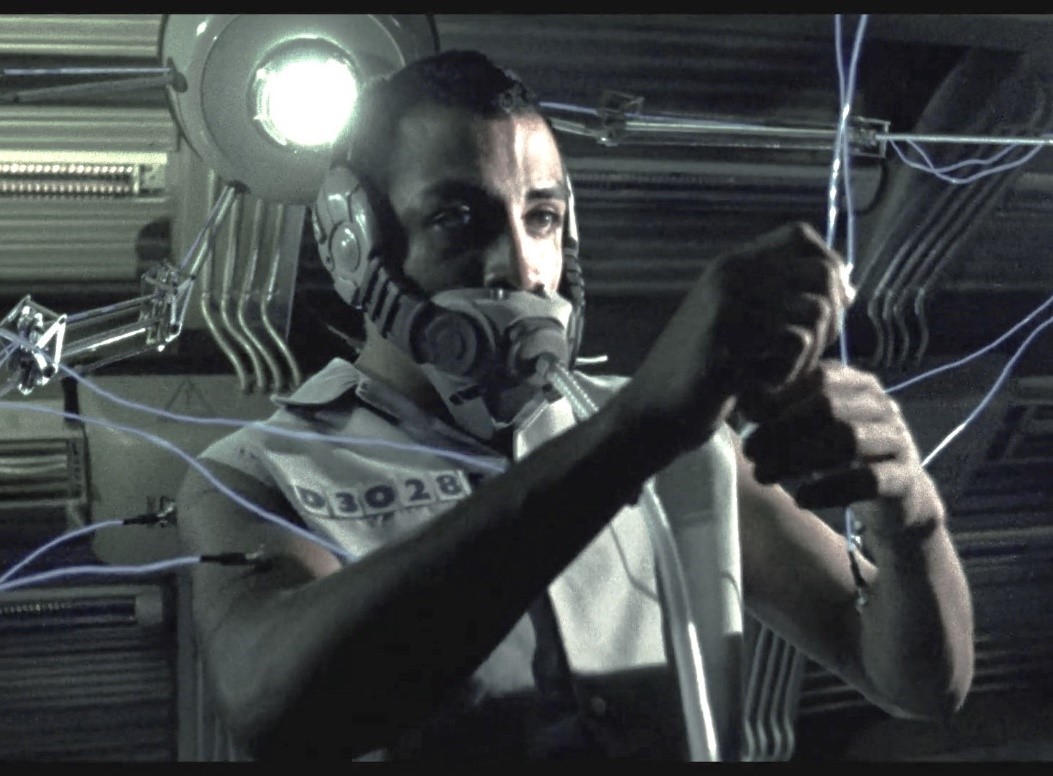
Note.
Image from the film Sleep Dealer (Rivera, 2008, 39:13).
Copyright 2008 by Alex Rivera. Used with permission.
|
|
Figure
2
Image
of Node Workers in a Factory
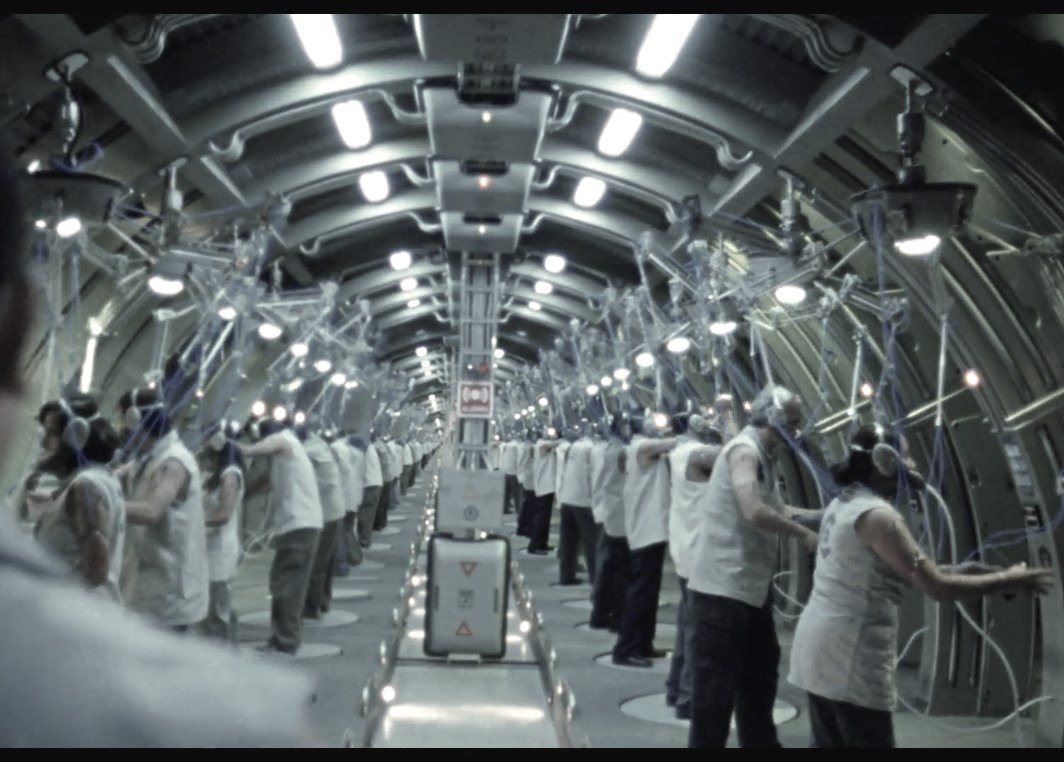
|
|
Note.
Image from the film Sleep Dealer (Rivera, 2008, 316:19).
Copyright 2008 by Alex Rivera. Used with permission.
|
In
the film, we meet the main character, Memo Cruz. He and his family
are farmers in a small South American town where the government
controls the water, held in a heavily guarded reservoir behind a huge
dam. Memo and his father must pay for small amounts of water to take
back home to water their meagre crops and to use for cooking and
washing. The government is always looking out for aqua terrorists who
try to steal the water. When Memo’s home-made transistor radio
is noticed by the government, he is mistakenly targeted as an
aqua-terrorist. A drone is sent to bomb his home, killing his father.
Devastated and distraught that his home-made radio caused the death
of his father, Memo leaves home and heads for Tijuana. He has heard
of nodes and hopes that he can become a node worker so that he can
send money back home to support his family. For Memo, the idea of
becoming a node worker is uncertain and yet it holds promise as the
solution to his desperate situation, much like the Ontario ECE
professionalization movement’s desire for a College of ECE and
codified ethics to solve the desperate problem of poor wages and
working conditions.
We
also meet Rudy Ramirez, the soldier who carries out the drone attack
that kills Memo’s father. In this dystopian reality, drone
attacks are televised like game shows and incite viewers in the fight
against aqua-terrorists. This is Rudy’s first mission. He
controls the drones through his own implanted nodes. The first drone
attack is a direct hit on Memo’s house and as his drone hovers
over the burning building, Rudy watches Memo’s father drag
himself out of the house bloodied and broken but still alive. Memo’s
father looks at the drone hovering over him. The host of the show
announces to the audience that it is a rare occurrence for a soldier
to get a chance to look into the face of the enemy. The show host and
the audience are in a frenzy as they cheer on Rudy to kill the
terrorist. As Rudy looks into the pleading face of Memo’s
father, he realizes at the last second that Memo’s father is
not a terrorist at all, but it is too late. There is too much at
risk. He pulls the trigger. Deeply troubled by what he has done, Rudy
seeks out Memo to make things right and, in the end (spoiler alert),
Rudy uses his own node connection to blow up the dam in Memo’s
hometown.
What
does it mean to think of both codes of ethics and nodes as “technical
solutions [that] are an intrinsic part of modernity’s
instrumental culture” (Dahlberg & Moss, 2005, p. 59)?
Staying close to this description/depiction of the ECE in neoliberal
times, there are a number of points of connections between the
College of ECE’s Code of Ethics (2017) and Rivera’s
(2008) nodes that I wish to explore, namely the dematerialization and
instrumentalization of the ECE through the privileging of the
scientific and technical over the ethical and political, through
distance and the acceptance of regulation in exchange for the false
promise of freedom, and through forms of discipline and violence that
force compliance in exchange for the ethical and political. Or how we
get “all the work without the worker” (Rivera, 2008,
36:27).
Dematerialization
and Instrumentalization of the ECE
The
Privileging of the Scientific and Technical Over the Ethical and
Political
The
dematerialization of node workers bodies occurs directly with the act
of having nodes implanted into their arms and upper back. The human
body, as it was, disappears and is transformed into something else by
the implantation of nodes, which are like electronic ports in the
flesh into which needles attached to cables can be inserted.
Instrumentalization happens when the cables are inserted into the
nodes and connect to the Internet and to a corresponding robot
somewhere in the U.S. The imagery of the dematerialization of
workers’ bodies in the film through the implanting of nodes
(see Figures 3 and 4) can be imagined as the dematerialization of the
RECE through the implanting or inscribing of scientific knowledge
(child development) and instrumental rationality (neoliberal
regulation) transforming the RECE into a worker-technician. Once
implanted with nodes, ECEs, like node workers, can hook into the
network, the machine, “[in]to a regulatory mode [node/code] of
modernity” (Dahlberg & Moss, 2005, p. 56), into a
profession dominated by the instrumentalizing developmental and
neoliberal discourses that dominate it; discourses that do not
require or recognize complex ethical relationality but rather seek to
eradicate the “uncertainty and ambivalence” of human and
more-than-human relations (Dahlberg and Moss, 2005, p. 59) through
the neutral or apolitical application of codified ethics. I also see
the dematerialization of the human through nodes and codes of ethics
as related to Dahlberg and Moss’s (2005) de-politicization and
de-ethicalization of ECEC through the privileging of the scientific
and technical over the ethical and political. Taking the ethical and
political to be that which makes the human human, means that
reducing the human to the scientific and technical is in effect a
dematerialization of the early childhood educator into a replaceable
worker-technician. What is more, the scientific and technical also
“privileges the universal over the local” (p. 56) thus
dematerialization through distance becomes even more evident.
|
Figure
3
Nodes
Being Implanted Into Memo
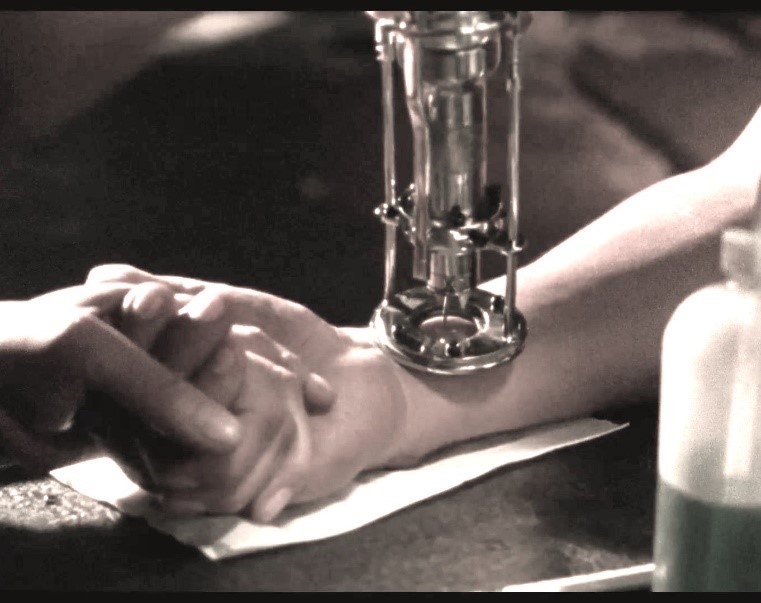
Note.
Image from the film Sleep Dealer (Rivera, 2008, 35:02).
Copyright 2008 by Alex Rivera. Used with permission.
|
|
Figure
4
Connecting
to the Machine via Nodes
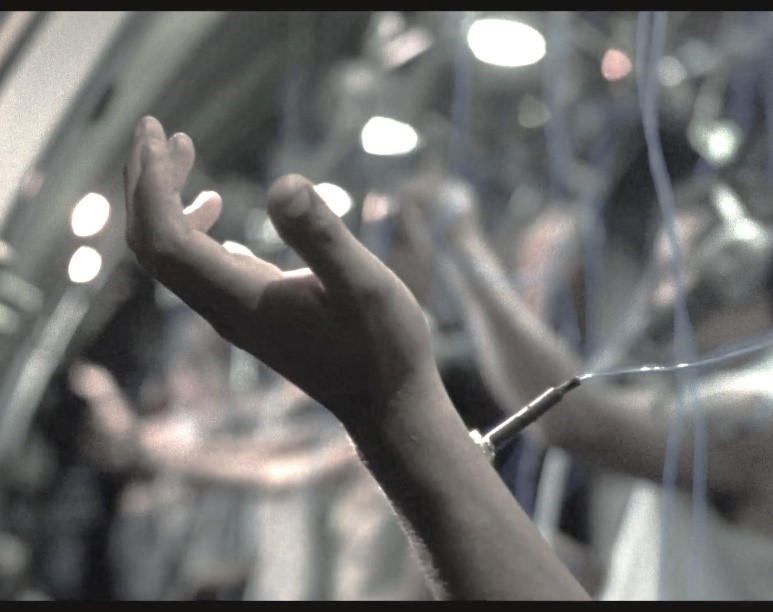
Note.
Image from the film Sleep Dealer (Rivera, 2008, 37:29).
Copyright 2008 by Alex Rivera. Used with permission.
|
The
organization of the College of ECE’s code of ethics around
distinct standards is also instrumentalizing and dematerializing as
it separates each standard into predetermined outcomes of achievement
that operate independent of each other. Each standard is like a
discreet node. Standard I: Caring and Responsive Relationships
(College of ECE, 2017, pp. 8–9), for example, stands alone from
all the other standards, yet it constitutes and infuses everything
that a RECE does. Separating caring and responsive relationships from
curriculum and pedagogy or health, safety and well-being
compartmentalizes and simplifies each of these expectations within
its own category, with its own set of recognizable and countable
outcomes. Caring and responsive relationships, however, are difficult
to quantify and are only recognizable when they are not caring or
responsive. Otherwise, caring and responsive relationships are taken
for granted while other standards that can be measured like
curriculum and pedagogy or health, safety, and well-being are given
precedence.
An
ethical dilemma that has been a central question in my own experience
as a RECE, and that drives my research, addresses the tensions
between the expectations for curriculum and pedagogy and engaging in
caring and responsive relationships with children in the everyday
moments of an early childhood classroom (Johnston, 2019). Without the
material support of paid planning time, I, like many RECEs, was
expected to complete all the requirements for planning, documenting,
and sharing documentation with families during the confines of the
workday, but often ended up working outside of my paid working hours
or completing paperwork while in program with children. When I made
an ethical choice one summer to forego the paperwork in favour of
truly being present with children and families, I was “caught”
and reprimanded during a licensing inspection for not having my
program plan complete. The messages I took away from this experience
were that the paperwork was more important than the relationships I
was engaged in, that I was not a “good” educator, and
that the curriculum I was implementing did not count if it was not
written down. The certainty of the paperwork outweighed the
uncertainty of relationships. I had tried to unhook myself from the
nodes and, therefore, became unrecognizable and unmanageable, so I
was re-inscribed with compliance with the techno-rationality of the
paperwork over the ethical relations.
Distance
and the Acceptance of Regulation in Exchange for the False Promise of
Freedom
The
nodes in Rivera’s (2008) film work to dematerialize the human
and the body in the way that the work takes place across vast
distances and transforms the human into a robot on the other side. I
see the “autonomous, active, flexible, response-able subject”
(Dahlberg & Moss, 2005, p. 59) as a dematerialized subject. In
Sleep Dealer distance manifests as no direct human oversight
of the node workers in the factory. Rather, workers are managed and
regulated from a distance through technology. In much the same way
the code of ethics regulates RECEs from a distance through their
formation as autonomous subjects, just as I was governed from a
distance through the paperwork. The images in Figure 5 depict a
moment in the film when Memo sees the reflection of the robot he is
controlling in a pane of glass. In this moment he realizes that he
has become the machine. Similarly, I argue that RECEs reflect and are
reflected by the College of ECE’s code of ethics and standards
of practice.
|
Figure
5
Memo
sees Himself as the Robot Reflected in a Pane of Glass
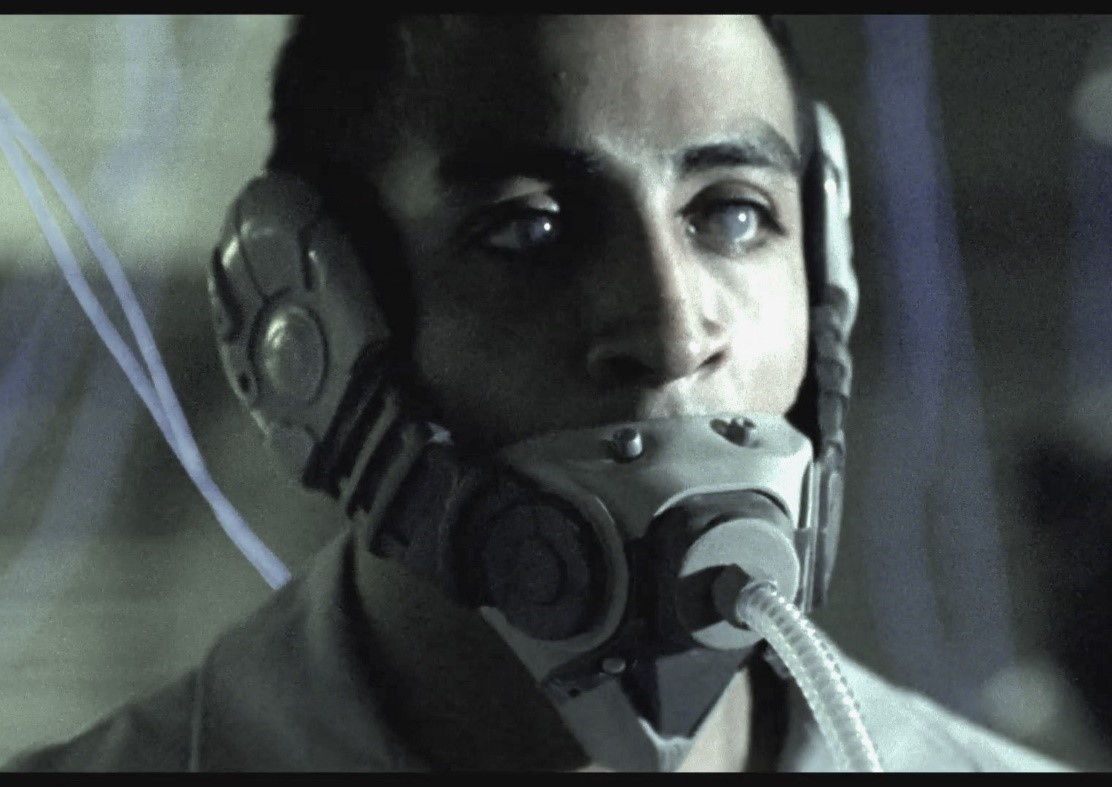
|
|
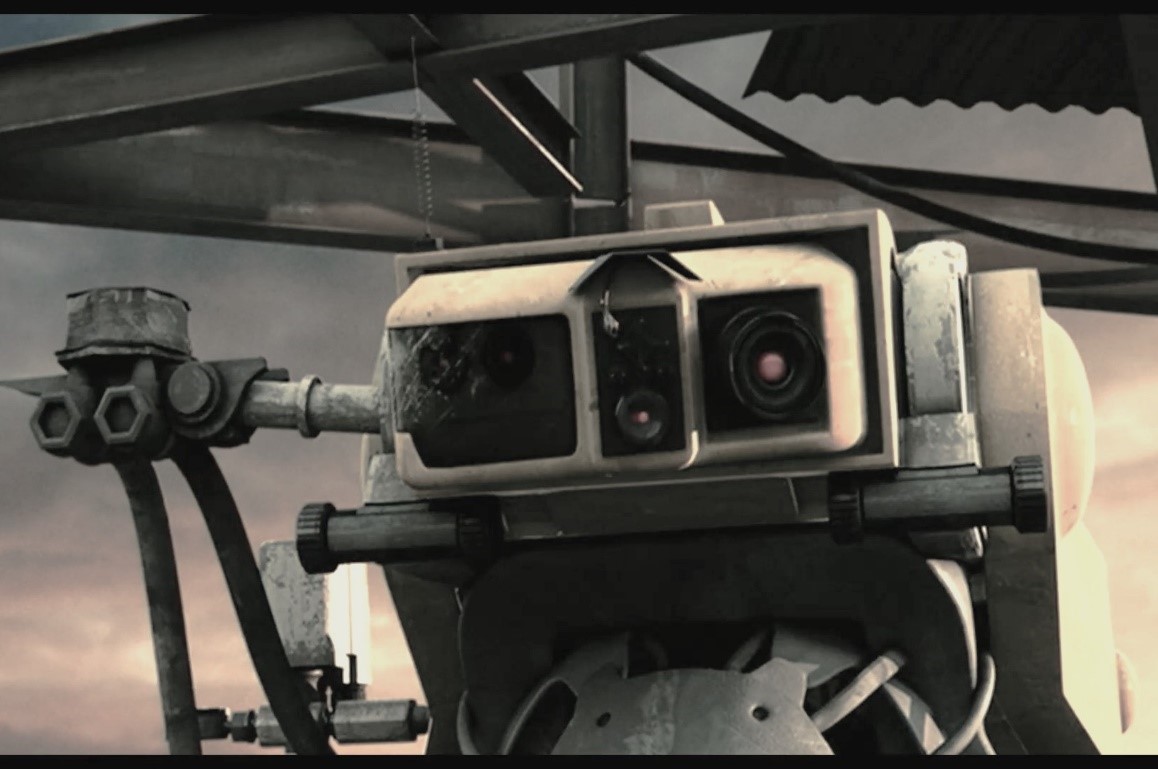
|
|
Note.
Images from the film Sleep Dealer (Rivera, 2008, 47:11 and
47:18). Copyright 2008 by Alex Rivera. Used with permission.
|
The
formation of the subject of the RECE thus occurs as the College of
ECE grants educators the right to call themselves a Registered ECE.
Simultaneously RECEs become subject to the code of ethics and
standards of practice in their dedication to upholding their ethical
(and personal) responsibilities to children, families, their
colleagues and the profession, the community and the public. Like
Todd’s (2003) argument that educators become receptacles for
knowledge in the form of codified ethics, as RECEs internalize the
code of ethics and standards of practice governing themselves
according to these codes and standards and acting autonomously within
them, they come to recognize themselves and are recognizable by their
knowledge of adherence to the code of ethics. Drawing on my own
example again, had I continued to sacrifice the relational and less
visible aspects of my work with children and families so that I could
complete the material aspects of the work, I would have been
recognized as a good educator (Johnston, 2019).
These
forms of regulation are readily taken up as the trade-off for the
freedom and promise of the technology. While nodes offer the promise
of work, the code of ethics offers the promise of
professionalization, creating the subject as a “bearer of
rights and responsibilities, self-governing, a practitioner of
freedom” (Dahlberg & Moss, 2005, p. 59). The freedom that
Dahlberg and Moss (2005) refer to here is a certain kind of freedom
that enables the autonomous subject to exercise “freedom-as-choice,
especially through competent participation in the marketplace and
rights-based contractual relationships” (p. 45). This illusion
of freedom, however, only works through an elaborate system of
convincing the population to govern themselves. For the ECEs this
elaborate system now includes a legally enforceable Code of Ethics
and Standards of Practice, continuous professional learning
requirements, yearly professional dues, and the threat of discipline
or someone reporting them to the College of ECE.
What
originally prompted me to investigate the imagery of nodes in Sleep
Dealer in relation to the code of ethics was this notion that,
just as workers in the film could only work if they had nodes, ECEs
in Ontario can only work and use the title of RECE, if they are
registered with the College of ECE. There is a widespread
misunderstanding that the College of ECE is supposed to do something
for ECEs, through the recognition of their education and expertise,
when in fact, as stated earlier, the mandate of the College is to
“protect the public interest and the integrity of the early
childhood education profession,” not the professional. Again,
it states that “no person shall engage in the practice of early
childhood education or hold himself or herself out as able to do so
unless the person holds a certificate of registration issued under
this Act” (College of ECE, 2017, p. 3). In other words, I
speculate that in a dystopian reality that this could easily be read
as one must have nodes to work as a RECE.
Forms
of Discipline and Violence That Force Compliance
Finally,
once dematerialized, node workers/ECEs become surveillable,
punishable, and replaceable through the very connections that
legitimize their work. Node workers in the film are docked pay if the
network detects a pause in their productivity (see Figure 6). When
Memo nearly passes out from over work and exhaustion, he is startled
awake by an electronic voice telling him that he has been inactive
for 10 seconds and his salary will be adjusted. Node workers are also
susceptible to infection and possibly fatal surges of electricity
that may feedback from the network/machine into their bodies through
the nodes. Similarly, ECEs are highly susceptible to illness
especially during COVID when working with unvaccinated children. When
a node worker is no longer able to work, they are unhooked, and
another takes their place. Indeed, Dahlberg and Moss (2005) noted
that nation states must cultivate a “ready supply of suitable
labour – flexible, responsive, skillful” (p. 49) to
remain competitive global markets, recognizing preschools as
technologies that maintain current labour participation and foster
future human and social capital. Strikingly, Rivera’s (2008)
imagery of nodes and node workers in factories eerily echoes Dahlberg
and Moss’s (2005) use of the metaphor of the factory to
describe early childhood programs rendered by neoliberalism as
services rather than educational spaces. They noticed how “the
concept understands institutions as places for applying technologies
to children to produce predetermined, normative outcomes, for the
efficient processing of children by workers-as-technicians”
(Dahlberg & Moss, 2005, p. 28).
|
Figure
6
Memo’s
Productivity is Monitored by the Network/Machine.
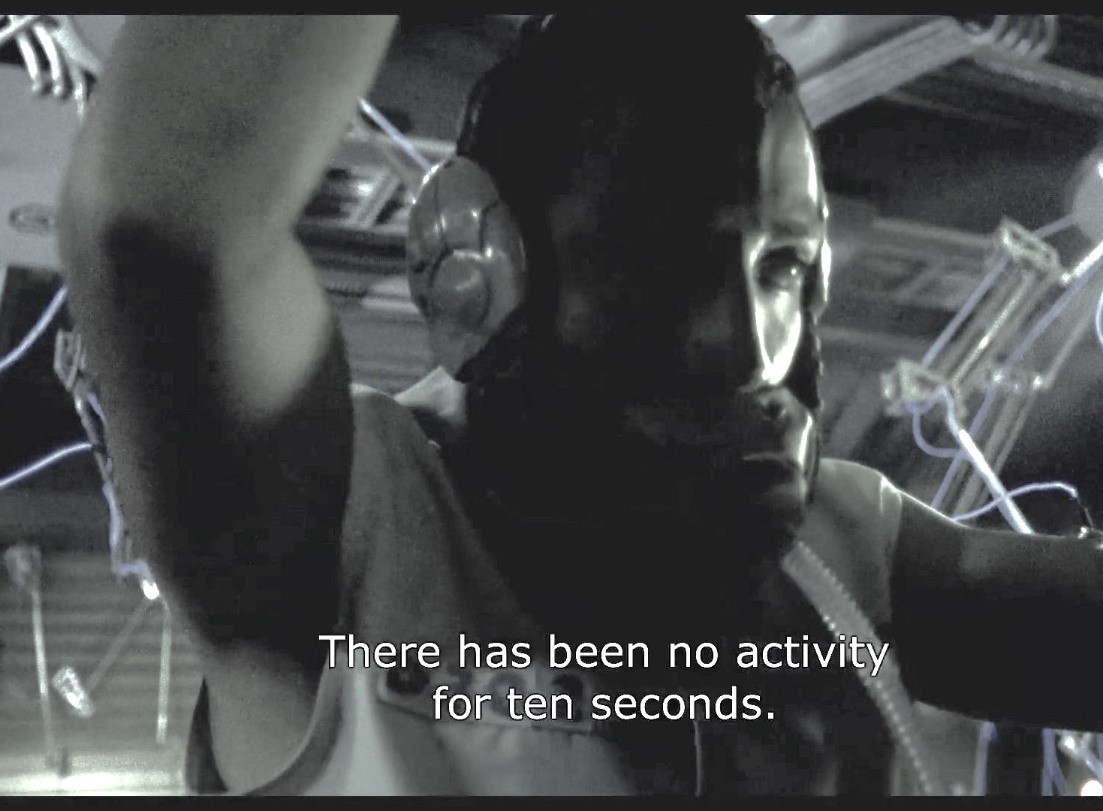
|
|
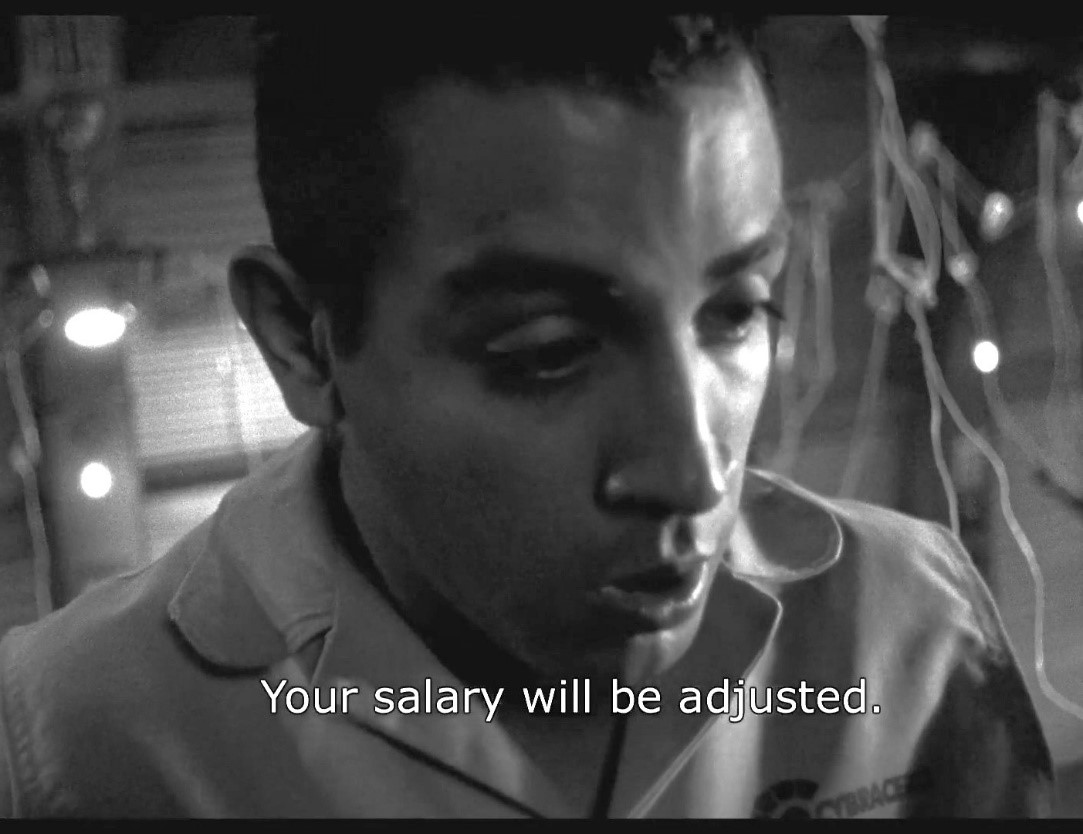
|
|
Note.
Images from the film Sleep Dealer (Rivera, 2008, 1:06:28
and 1:06:37). Copyright 2008 by Alex Rivera. Used with permission.
|
RECEs,
subject to the code of ethics, are always under surveillance by the
College of ECE through their annual professional dues and through
random audits of their professional learning portfolios. RECEs are
also surveilled by the public through the public registry of members
in good standing, and by their supervisors and colleagues. Every RECE
under Standard IV: Professionalism and Leadership is responsible to
“report professional misconduct, incompetence and incapacity of
colleagues which could create a risk to the health or well-being of
children or others to the appropriate authorities” by their
colleagues (College of ECE, 2017, p. 15). This standard opens a lot
of grey areas and exposes the non-neutrality of codified ethics,
where racism, for example, can seep into personal and professional
judgements. Recall Todd’s (2003) warning that the moral
authority in determining codes of ethics is founded in colonial and
imperial ideals.
In
my own experience of being reprimanded for not having completed my
paperwork during a licensing inspection, I faced considerably mild
punishment; however, I was aware that it could have been worse had I
not been protected by being in a unionized position. Punishment such
as the suspension of one’s right to practice can also occur
because an RECE has not paid their professional dues on time, or they
have not completed their expectations for Continuous Professional
Learning (CPL), or they have falsely claimed to be a Registered ECE.
For RECEs who continue to make low wages paying yearly professional
dues can be a financial strain. As well the expectations for CPL
require time to engage in some form of learning that may or may not
be paid for, or that either requires time outside of working hours or
time off work to complete. The process of documenting one’s CPL
is also a time-consuming process that is not supported within the
paid workday. In essence, the expectations on RECEs for maintaining
their professional status directly impacts them financially. When
RECEs are working on their own time, they are essentially lowering
their wages even more, whereas registering as an RECE is meant to
significantly increase wages.
As
for replaceability, we are currently witnessing a retention crisis in
the ECE workforce in Ontario (Jones, 2022b) due to the COVID-19
pandemic and its exacerbation of the historic and systemic issues of
poor wages and working conditions. The response has been to increase
recruitment—simply train and replace a new set of workers.
Billions of dollars have been poured into compressed college programs
and free tuition for ECE students (for example see Durham College,
2022; George Brown College, 2022), while the current wage floor for
ECEs has been announced at $18.00 an hour, well below what ECEs who
work in Full Day Kindergarten make and well below what is needed to
have a livable wage in Ontario (Jones, 2022a). If RECEs are simply
replaceable then the transformation of the RECE into the worker
technician is complete. The ethical educator is not needed to be
present, only a dematerialized body that adheres to the “new
and continuous forms of discipline and control [that] provide ever
more effective ways to form and govern this subject” (Dahlberg
and Moss, 2005, p. 59). All the work without the worker. Is this how
we shall live?
Rethinking
the Ethical
I
return now to Todd (2003) and her concern with rethinking ethics and
education as an ethical relationality. What Todd (2003) means is that
we must not solely rely on an epistemological understanding of ethics
in education, an ethics based on having the right moral knowledge and
applying it to the knowability of the Other through categorizing
their social and material position in relation to intersecting forms
oppression. Rather, education
and educators must also take up a philosophical understanding of the
Other. Todd (2003) refers specifically to Levinas’s concept of
the Other as a radical alterity with whom we are already in ethical
relationality. How is ethical relationality already an orientation
that punctures the codified standard of caring and responsive
relationships? How might embodying this ethical relationality
re-materialize the ECE?
In
Sleep Dealer, Rudy Ramirez, the soldier and drone operator who
kills Memo’s father, thinking that he is killing an
aqua-terrorist, is confronted with the ontological otherness of
Memo’s father when he looks into his face (see Figure 7). This
moment creates uncertainty for Rudy that he cannot reconcile. While
the expectations of his employment are that he carries out orders in
destroying the enemy, once he is confronted with the face of the
Other as a radical alterity and not as an enemy (even though
in the moment of seeing the face of the Other, he does follow
orders), he is deeply troubled by his actions which he now
experiences as unethical.
Figure
7
Rudy
Looks Into the Face of Memo’s Father.
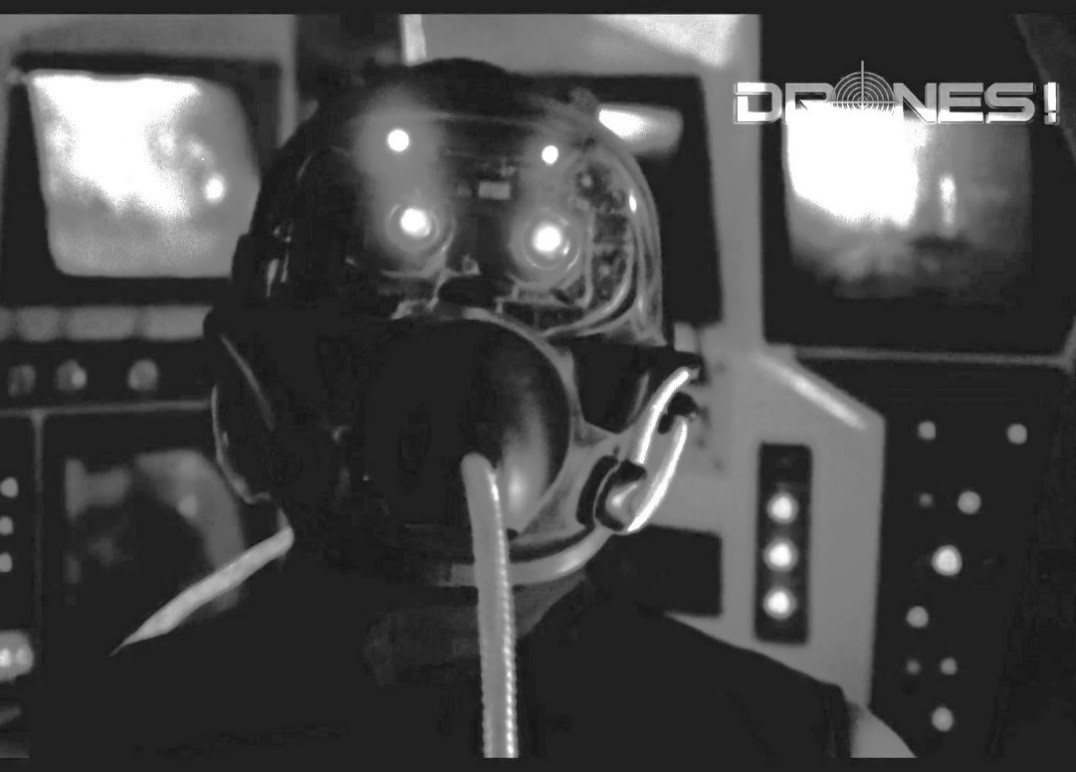
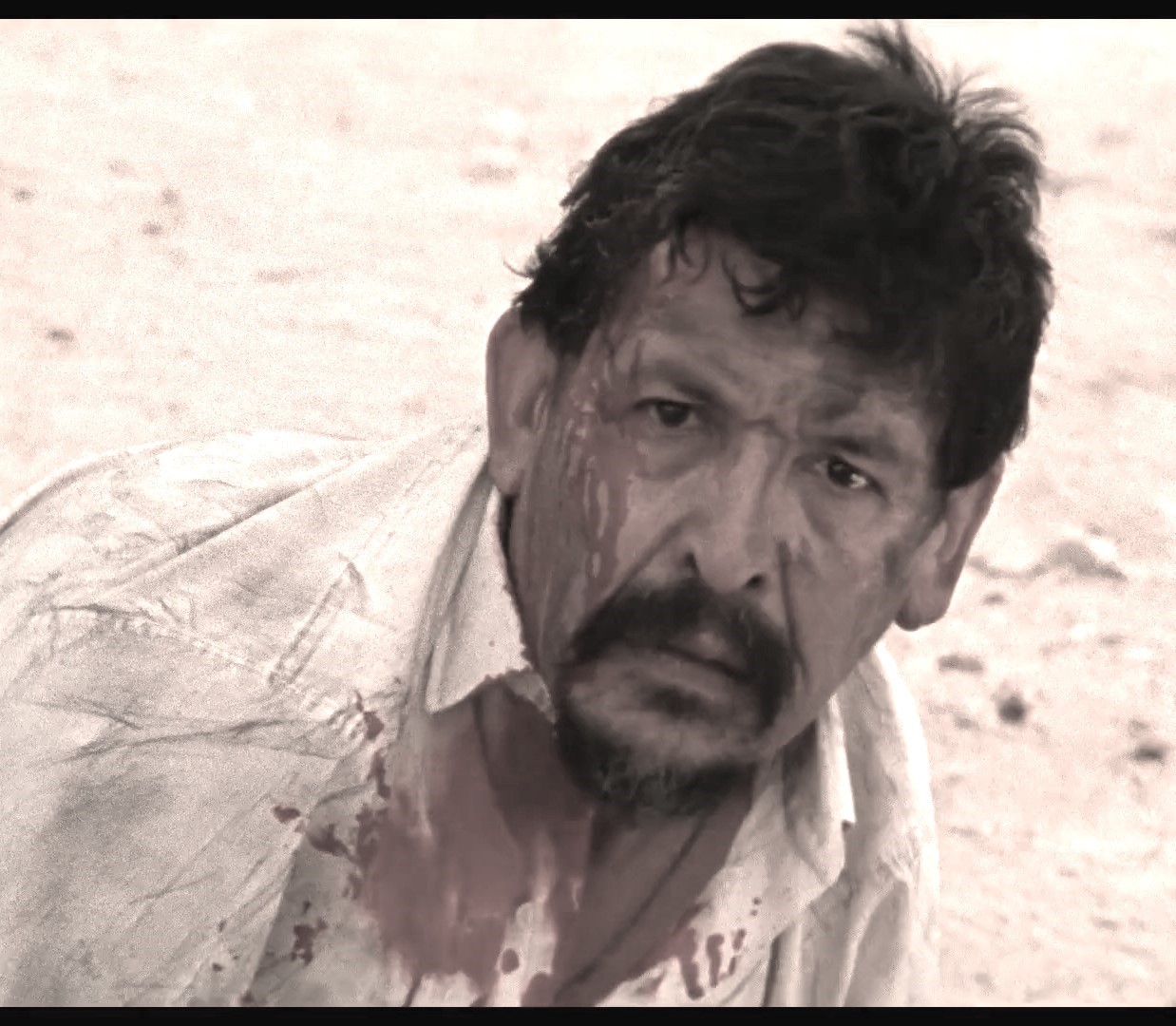
Note.
Images from the film Sleep Dealer (Rivera, 2008, 16:16 and
16:31). Copyright 2008 by Alex Rivera. Reprinted with permission.
Rudy’s
next actions answer this question. No longer able to comply with the
expectations of the system, Rudy is compelled to make an ethical
choice to use his nodes, his connections to the system, to subvert
it. Together with Memo, he sneaks into the node factory, connects to
his drones, and uses them to blow up the dam in Memo’s village
(see Figure 8). This act brings relief and access to water for
everyone in Memo’s village. Though this act brings more
uncertainty for Rudy’s future, it also brings hope and a way of
living well together. So, “what happens to ethics and [early
childhood] education when learning is not about understanding the
other but about a relation to otherness prior to understanding?”
(Todd, 2003, p. 9). How might we recover nodes as a way of enacting
ethical relations like the way Rudy uses his nodes to act ethically
in relation to the Other? Again, Todd (2003) invited us to think
about how “conditions instead of principles, codes, and rules,
ethics might be considered in terms of those moments of
relationality that resist codification” (p. 9). What are
these conditions in ECEC?
Figure
8
Blowing
up the Dam.

Note.
Image from the film Sleep Dealer (Rivera, 2008, 1:22:11).
Copyright 2008 by Alex Rivera. Reprinted with permission.
In
Sleep Dealer, blowing up the dam is a moment of relationality
that resists codification. Rudy knows that killing Memo’s
father was unethical even though it was sanctioned by the state, and
he was lauded as a hero for killing an aqua-terrorist. Blowing up the
dam is an ethical act that defies the status quo and the disciplinary
technologies of the government. It is extremely risky and in fact
Rudy must leave Tijuana and go into hiding. He can no longer be a
soldier; he can no longer work. At the same time, it creates
conditions for an ethical relationality between Memo and Rudy that
extends beyond them to Memo’s family and his village. Likewise,
my choice to be present with children and families was also a moment
of relationality that resisted the codification of writing the
program plan. Time and support were the resources being held behind a
dam. In the neoliberal and patriarchal context of professionalism in
ECE, not having paid planning time meant that I was expected to do
more with less time and support and constantly worked against my
ethical commitment to cultivate caring and responsive relationships
with children and families. This is the reality for many RECEs
currently and even more so with the increased expectations for
cleaning and sanitizing due to the COVID-19 pandemic. It may be why
RECEs are leaving the profession and why preservice students are
choosing to bypass this profession and use their college training as
a stepping stone to somewhere else. For me, not doing the program
plan and writing this article are small moments of blowing up the
dam, of resisting the codified identity of professionalism. It is
risky. However, the current masculinist construction of
professionalism is also risky and harmful. There is too much at stake
not to take the risk. Ethical relations require time and are not
quantifiable. How then do we reconceptualize professionalism in ECE
as ethical relations? Materially RECEs need to have paid time in
their workday to collaborate with each other about what this means in
their own situated contexts. They also need other ways of thinking
about their work and valuing the ethical relations they engage in
every day.
In
considering how we might recover nodes as conditions for ethical
relations, I draw on Zylinska’s (2014) work to think about how
nodes are a network of relations in conversation with Ingold’s
(2011) concepts of meshworks and knots. Zylinska (2014) was concerned
about how we live in the context of the Anthropocene, this geologic
time that we are currently living in as one that has been greatly
impacted by human interaction, and that warnings of an oncoming
dystopian, ruined future. In response, Zylinska (2014) argued for a
minimal ethics that hinges on a repositioning of the human from a
place of supremacy, predicated on scientific ontologies that claim
certainty in knowledge, and that use knowledge to create
technological rationalities to justify their degradation of the
planet, to a place of human singularity that acknowledges our actions
as contingent and consequential. From this place of singularity,
Zylinska (2014) invited us as humans to see ourselves as situated
always and already in relation to the processes of matter and time
that extend beyond our capacity to comprehend them.
Zylinska
(2014) thought about the human as “an entangled and dynamically
constituted node in the network of relations to whom an address is
being made and upon whom an obligation is being placed, and who is
thus made-temporarily-singular precisely via this address” (p.
74). This conceptualization of a node is different from the
intentional function of nodes in Sleep Dealer in that it
invites uncertainty, ambivalence, and complexity in its singularity.
It resists codification. The instance when Rudy looks into the face
of Memo’s father a node is created that did not exist before.
It was not predetermined. Memo’s father addresses Rudy who is
obligated in that moment to respond to the radical alterity of the
Other. Even though he does not act ethically in this moment, the
obligation to make things right drives him to use his position as a
node in the network to respond to the address.
Further,
Zylinska (2014) reconceptualized nodes from a techno-rationality into
a relational ethics by reconceptualizing the network not as a
dematerializing system of cables leading to somewhere, but as a
network of relations. Rudy, Memo, and Memo’s father form a
network of relations operating within and outside of the
techno-rationality of the network. Referring again to my own
experience shared earlier, I think about how the ethical choice I
made to engage deeply in a network of relations with children and
families was a response to the address placed on me by the Other, and
how it also created nodes of ethical relationality in the network
that were unrecognizable to the licensing inspector.
Zylinska’s
(2014) use of the word network in relation to the concept of a
node, however, still echoes a sense of the scientific and technical.
I want to trouble further this by intersecting with Ingold’s
(2011) thinking of meshwork and knots to reposition and situate nodes
as more than static and organized points of connection. For Ingold
(2011) networks evoked images of efficient points of connection that
one can be connected to and may be entered into from various points
or nodes in the network. A meshwork, however, is much less organized,
technical, and predictable than the concept of a network suggests.
Ingold (2011) also envisioned a meshwork as storied and thus
relational:
It
is a world of movement and becoming, in which any thing—caught
at a particular place and moment—enfolds within its
constitution the history of relations that have brought it there. In
such a world, we can understand the nature of things only by
attending to their relations, or in other words, by telling their
stories. Indeed, the things of this world are their stories,
identified not by fixed attributes but by their paths of movement in
an unfolding field of relations. Each is the focus of ongoing
activity. Thus, in the storied world, things do not exist, they
occur. Where things meet, occurrences intertwine, as each becomes
bound up in the other’s story. (p. 199)
Ingold’s
(2011) meshwork conjures sensorial images of looped and knotted
string or rope entangled together and instead of nodes he thought
with knots. In fact, node and knot both originate from the Latin
nodus (Etymology online, n.d.). Where a node is a point of
connection in a network that one can connect into (and disconnect
from) as illustrated in the imagery in Sleep Dealer (2008), a
knot in a meshwork gives the feeling of a deeper processual
permanence. The meshwork is created through the making of knots
and/as stories in and with the work. The human is thus repositioned
in relation with the storied knots in the meshwork. The human’s
place in the meshwork is also contingent on their relations and the
stories that are woven together through their relations. In this way
the meshwork then makes space for “uncertainty and ambivalence”
(Dahlberg & Moss, 2005, p. 56) as well as for variability and
unpredictability. To create a meshwork requires trust and “relations
across difference” (Todd, 2003, p. 3) that respond to the
ethical and political in human and more-than human relations. What
would it mean to recognize the knotted and storied meshworks in ECE
that interrupt coded and technical networks? Or to take up Dahlberg
and Moss’s (2005) concept of “children’s spaces”
or “meeting places … where the coming together of
children and adults, the being and thinking beside each other, offers
many possibilities” (p. 28), as not just physical spaces but
also social, cultural, and discursive spaces where stories are woven
together into the fabric of democracy. Might it reassert the ethical
into early childhood practice as professionalism?
Everyday
ECEs encounter the radical alterity and otherness of the children and
families they share spaces with. They are story tellers with children
and families, attuned to and continuously co-creating conditions of
relationality and care, yet the storied meshworks of their relations
are continually reshaped and fitted into techno-rational networks of
accountability and compliance and node-ified ethics. Like my own
story of non-compliance, I had no longer accepted this reshaping of
my practice, the counting of my work only as the recognizable program
plan instead of an impromptu trip to the park. Our collective call to
activism is to reassert the ethical in early childhood education by
recognizing and valuing the knotted and storied meshworks of
educators that already exist, and to support them with the
professional pay and working conditions that provide them with the
time and space needed to engage in the ethical relations that blow up
coded and technical networks.
In
this article, I have taken up Tuck’s (2018) question of “How
shall we live?” (p. 157) to problematize the ethical in codes
of ethics in ECEC. I began by situating codified ethics within the
broader context of professionalization in Ontario and internationally
and offering a critique of how professionalism has not brought ECEs
the promised material recognition they were seeking but has rather
resulted in more regulation. Drawing on Todd (2003), I took up a
philosophical critique of codified ethics and explore her invitation
to rethink ethics in education as an ethical relationality. I then
weave together Dahlberg and Moss’s (2005) analysis of
neoliberalism’s creation of early childhood educator as a
worker-technician, the College of ECE’s Code of Ethics and
Standards of Practice and my own experience as an RECE along with the
aesthetic device of nodes in the dystopian film Sleep Dealer
(Rivera, 2008), to explore how codified ethics, as they become
enforceable within a regulatory body such as the College of ECE,
instrumentalize and dematerialize the early childhood educator.
Finally, in conversation with Zylinska and Ingold, I repositioned
nodes and networks as knots and meshworks and offer this article as
both a warning and a call to activism to reposition the ethical and
relational as central to early childhood education, to nurture not
only the lives of children and families but also the ethical,
political, and liveable futures of early childhood educators.
References
Association
of Early Childhood Educators Ontario (AECEO). (2008). Code of ethics.
ECE Link, Winter 2008.
Association
of Early Childhood Educators Ontario (AECEO). (2010). AECEO history:
A review of our milestones. ECE Link, Fall, 2010.
Association
of Early Childhood Educators Ontario (AECEO). (2016). “I’m
more than ‘just’ an ECE”: Decent work from the
perspective of Ontario’s early childhood workforce.
https://d3n8a8pro7vhmx.cloudfront.net/aeceo/pages/930/attachments/original/1477442125/MoreThanJustanECE_Sept16.pdf?1477442125
Australian
Early Childhood Association. (1990). Code of ethics.
Cannella,
G. F. S. (1997). Deconstructing early childhood education: Social
justice and revolution. Peter Lang.
Flanagan,
K., Beach, J., & Varmuza, P. (2013). “You
bet we still care!” A survey of centre-based early childhood
education and care in Canada:
Highlights
report.
Child Care Sector Human Resources Council.
https://childcarecanada.org/documents/research-policy-practice/13/02/you-bet-we-still-care
College
of Early Childhood Educators. (2017). Code
of ethics and standards of practice, (2nd
ed.).
https://www.college-ece.ca/members/standards-in-practice/
Dahlberg,
G., & Moss, P. (2005). Ethics and politics in early childhood
education. Routledge Falmer.
Doherty,
G., Lero, D., Goelman, H., LaGrange, A., & Tougas, J. (2000). You
bet I care. A Canada-wide study on wages, working conditions and
practices in child care centres. Centre for Families Work and
Well-Being, University of Guelph.
Durham
College. (2022, May 24). College
now accepting applications for compressed early childhood education
program.
https://educationnewscanada.com/article/education/level/colleges/2/962463/college-now-accepting-applications-for-compressed-early-childhood-education-program.html
Early
Education. (2011). Code of ethics. British Association for
Early Childhood Education.
Feeney,
S., & Kipnis, K. (1989). A new code of ethics for early childhood
educators: Code of Ethical Conduct and Statement of Commitment. Young
Children, 45(1), 24–29.
George
Brown College (2022, October 17). GBC
launches new early childhood education (compressed) program to
address challenges in the ECE sector.
https://www.georgebrown.ca/news/2022/gbc-launches-new-early-childhood-education-compressed-program-to-address-challenges-in-the-ece-sector
Ingold,
T. (2011). Being alive. Routledge
Johnston,
L. (2019). The (not) good educator: Reconceptualizing the image of
the educator. ECE Link, Fall 2019. Association of Early
Childhood Educators Ontario.
Jones,
A. (2022a, May 22). Childcare
affordability leads to questions of space creation in Ontario
election. The
Canadian Press.
https://www.thestar.com/politics/2022/05/22/child-care-affordability-leads-to-questions-of-space-creation-in-ontario-election.html
Jones,
A. (2022b, October 8). As
childcare expands in Ontario, advocates wonder who will staff those
spaces. The
Canadian Press.
https://www.cbc.ca/news/canada/toronto/ontario-childcare-workforce-1.6611088
Katz,
L. (1984). The professional early childhood teacher. Young
Children 39(5), 3–10.
Langford,
R., Prentice, S., Albanese, P., Summers, B., Messina-Goertzen, B., &
Richardson, B. (2013). Professionalization as an advocacy strategy: A
content analysis of Canadian child care social movement
organizations’ 2008 discursive resources. Early
Years, 33(3),
302–317. http://dx.doi.org/10.1080/09575146.2013.789489
Levinas,
E. (1989). Ethics as first philosophy. In S. Hand (Ed.), The
Levinas reader: Emmanuel Levinas (pp. 75-87). Basil Blackwell
Ltd.
Lichtenberg,
J. (1996). What are codes of ethics for? In M. Coady & S. Block,
(Eds.), Codes of ethics and the professions (pp. 13–27).
Melbourne University Press.
National
Association for the Education of Young Children (NAEYC). (1998). Code
of ethical conduct and statement of commitment (Rev. ed.)
[Brochure].
Online
Etymology Dictionary. (n.d.). Node. Retrieved December 14, 2022 from
https://www.etymonline.com/search?q=node
Ontario
College of teachers (2022). Ontario regulatory body fees. Ontario
regulatory bodies membership fee comparison: 2021 membership year
https://www.oct.ca/members/college-fees/ontario-regulatory-body-fees
Osgood,
J. (2006). Deconstructing professionalism in early childhood
education: Resisting the regulatory gaze. Contemporary Issues in
Early Childhood, 7(1), 5-14. doi:10.2304/ciec.2006.7.1.5
Oxford
University Press. (n.d.). Dematerialize. In Oxford
English Dictionary (OED) Online. Retrieved
December
5, 2022 from www.oed.com/view/Entry/49605
Popkewitz,
T. (1994). Professionalization in teaching and teacher education:
Some notes on its history, ideology, and potential. Teaching &
Teacher Education, 10(1), 1–14.
Rivera,
A. (Director). (2008). Sleep dealer [Film]. Likely Story.
Saracho,
O.N., & Spodek, B. (1993). Professionalism and the preparation of
early childhood education practitioners. Early Child Development
and Care, 89, 1-17
The
Office of Early Childhood Education—Te Tari Mātauranga
Kōhungahunga. (2022, January). Code of ethical conduct.
https://oece.nz/public/information/ethics/code-of-ethical-conduct/
Todd,
S. (2003). Learning from the other: Levinas, psychoanalysis and
ethical possibilities in education. State University of New York
Press.
Tuck
E. (2018). Biting the university that feeds us. In M. Spooner &
J. McNinch (Eds.), Dissident knowledge (pp. 149–167).
University of Regina Press.
Urban,
M., Vandenbroeck, M., Van Laere, K., Lazzari, A., & Peeters, J.
(2012) Towards competent systems in early childhood education and
care: Implications for policy and practice. European Journal of
Education, 47(4), 508–526.
Zylinska,
J. (2014). Minimal ethics for the Anthropocene (1st ed.). Open
Humanities Press.
Endnote










